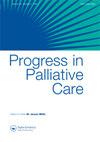Role of percutaneous nephrostomy in cancer patients
IF 0.8
Q4 PUBLIC, ENVIRONMENTAL & OCCUPATIONAL HEALTH
引用次数: 0
Abstract
Ureteric obstruction is common in cancer patients, representing an unfavorable prognostic factor in this population. Percutaneous nephrostomy (PCN) is often performed in these patients to prevent renal dysfunction and potentially increase survival. However, this procedure may negatively affect patients’ quality of life, and its survival benefit is not established. The objective is to characterize the population of cancer patients undergoing PCN, assess complications related to PCN, and identify potential prognostic factors in this population. Ninety-two patients were included; the median age was 70 years (range: 26–85), and 55 (60%) were males. Most patients had metastatic disease (n = 51; 55%). Bladder (n = 24; 26%), prostate (n = 15; 16%), and rectum (n = 10; 11%) were the most frequent primary tumor topographies. Twenty-seven patients (29%) had NPC-related complications, 16 (17%) had more than one complication, and 20 (22%) required hospitalization. The most frequent complications were infection (n = 23; 25%) and obstruction (n = 14; 15%). In the multivariate analysis, malignant obstructive uropathy was the only independent prognostic factor post-PCN. After three years of follow-up, 70 patients (76%) had died, mainly from cancer progression, and 2 (2%) due to PCN-related complications. Given the potential benefits and burdens, patients and, in some cases, family members should be involved in the decision. The problem is not the efficacy of PCN but the adequacy of the decision in the face of a limited life expectancy.经皮肾造口术在癌症患者中的作用
本文章由计算机程序翻译,如有差异,请以英文原文为准。
求助全文
约1分钟内获得全文
求助全文
来源期刊

PROGRESS IN PALLIATIVE CARE
PUBLIC, ENVIRONMENTAL & OCCUPATIONAL HEALTH-
CiteScore
2.60
自引率
11.80%
发文量
24
期刊介绍:
Progress in Palliative Care is a peer reviewed, multidisciplinary journal with an international perspective. It provides a central point of reference for all members of the palliative care community: medical consultants, nurses, hospital support teams, home care teams, hospice directors and administrators, pain centre staff, social workers, chaplains, counsellors, information staff, paramedical staff and self-help groups. The emphasis of the journal is on the rapid exchange of information amongst those working in palliative care. Progress in Palliative Care embraces all aspects of the management of the problems of end-stage disease.
 求助内容:
求助内容: 应助结果提醒方式:
应助结果提醒方式:


